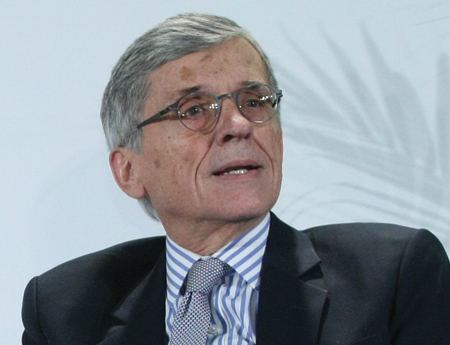Wheeler: FCC is Collecting Info on Paid Peering

The smarter way to stay on top of broadcasting and cable industry. Sign up below
You are now subscribed
Your newsletter sign-up was successful
FCC Chairman Tom Wheeler said Friday that the commission has obtained the paid peering agreements between Comcast/Netflix and Verizon/Netflix and is asking other ISPs and content providers for information.
"We are making inquiries across the board," he said. "For example, if we are talking about video as being a driving force in this it would be kind of silly not to include YouTube, wouldn't it."
He said the point is to find out what is going in those broadband traffic interconnect handoffs and whether consumers are being harmed. Wheeler said the FCC has broad authority in “the public interest, convenience and necessity” to act if it finds that is the case. "Consumers must get what they pay for," he said.
Wheeler said the issue is that when a consumer buys access from an ISP, they are buying access to the whole Internet at a speed level and they ought to have that capability. What he said this examination looks at is what is going on when the ISP is connecting to the Internet.
This new info collection is separate from the Open Internet order, Wheeler said, but obviously related (the Open Internet order also asked questions about paid peering). He said he continues to see the peering issue as distinct from network neutrality--he called them 'cousins.' He said he was not looking to expand the definition of net neutrality beyond the last mile to include peering agreements.
"We need to parse the process," he said, "and there is the delivery from peering to the consumer's computer, then there is what happens at the traffic exchange point. Those are driven by different technology realities and perhaps different economic realities. What we are trying to do is get to the bottom of that. But I think that they are two different things."
"In order to do what"," he was asked. " In order to answer the question of what was going on.
The smarter way to stay on top of broadcasting and cable industry. Sign up below
Wheeler announced the effort at the press conference following the FCC's public meeting. He made clear he was only gathering info, not pointing fingers.
Below is his statement announcing the new effort.
“For some time now we have been talking about protecting Internet consumers. At the heart of this is whether Internet Service Providers (ISPs) that provide connectivity in the final mile to the home can advantage or disadvantage content providers, and therefore advantage or disadvantage consumers.
“What we call the Open Internet rule on which we are currently seeking comment is one component of this. If adopted, the new rule would prohibit bad acts such as blocking content or degrading access to content. This kind of activity within an ISP’s network has traditionally been the focus of net neutrality.
“But there is another area of Internet access, and that is the exchange of traffic between ISPs and other networks and services. The recent disputes between Netflix and ISPs such as Comcast and Verizon have highlighted this issue.
“In reading the emails I receive, I thought this one from George pretty well sums up public concern:
“Netflix versus Verizon: Is Verizon abusing Net Neutrality and causing Netflix picture quality to be degraded by 'throttling' transmission speeds? Who is at fault here? The consumer is the one suffering! What can you do?
“We don’t know the answers and we are not suggesting that any company is at fault. But George has gone to the heart of the matter: what is going on and what can the FCC do on behalf of consumers? Consumers pay their ISP and they pay content providers like Hulu, Netflix or Amazon. Then when they don’t get good service they wonder what is going on. I have experienced these problems myself and know how exasperating it can be.
“Consumers must get what they pay for. As the consumer’s representative we need to know what is going on. I have therefore directed the Commission staff to obtain the information we need to understand precisely what is happening in order to understand whether consumers are being harmed.
"Recently, at my direction, Commission staff has begun requesting information from ISPs and content providers. We have received the agreements between Comcast and Netflix and Verizon and Netflix. We are currently in the process of asking for others.
“To be clear, what we are doing right now is collecting information, not regulating. We are looking under the hood. Consumers want transparency. They want answers. And so do I.
“The bottom line is that consumers need to understand what is occurring when the Internet service they’ve paid for does not adequately deliver the content they desire, especially content they’ve also paid for. In this instance, it is about what happens where the ISP connects to the Internet. It’s important that we know – and that consumers know.”
Contributing editor John Eggerton has been an editor and/or writer on media regulation, legislation and policy for over four decades, including covering the FCC, FTC, Congress, the major media trade associations, and the federal courts. In addition to Multichannel News and Broadcasting + Cable, his work has appeared in Radio World, TV Technology, TV Fax, This Week in Consumer Electronics, Variety and the Encyclopedia Britannica.

